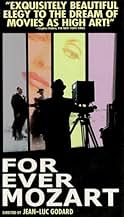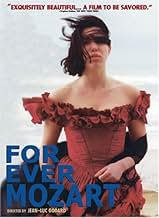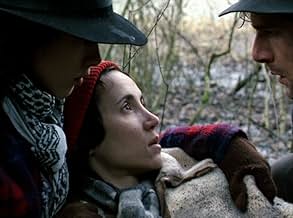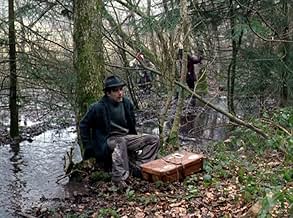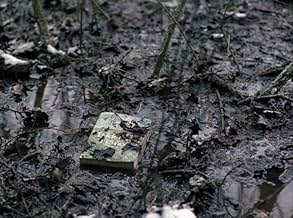CALIFICACIÓN DE IMDb
6.1/10
1.2 k
TU CALIFICACIÓN
Cuatro historias distintas pero relacionadas, entre ellasun joven grupo de idealistas y sus intentos de representar una obra en Sarajevo y la guerra y los esfuerzos de un director de edad ma... Leer todoCuatro historias distintas pero relacionadas, entre ellasun joven grupo de idealistas y sus intentos de representar una obra en Sarajevo y la guerra y los esfuerzos de un director de edad mayor para completar su película.Cuatro historias distintas pero relacionadas, entre ellasun joven grupo de idealistas y sus intentos de representar una obra en Sarajevo y la guerra y los esfuerzos de un director de edad mayor para completar su película.
- Premios
- 1 premio ganado y 2 nominaciones en total
- Dirección
- Guionista
- Todo el elenco y el equipo
- Producción, taquilla y más en IMDbPro
Opiniones destacadas
I just saw this film last night at the UC theatre in Berkeley CA. It was great; I'm only 23 so I see Goddard's classic movies in a different context than the generation that saw them released. For anyone who says "they" don't make movies like this, hey, Jean=Luc does. NOt "Terminator 4" Not "The Fatal Bolero". The movie will definitely displease anybody with hang-ups about continuity. But for those who appreciate aesthetics and politics, this will be a treat.
This seemed quite accessible to me, at least in the context of late Godard. The title is a pun on "Il Faut Rever", setting the theme of art in troubled times. The story is about a group of young and somewhat naive actors setting off to perform the Musset play "On Ne Badine Pas Avec L'Amour" (One mustn't trifle with love") in Sarajevo and coming the inevitable cropper on the way. Meanwhile the lead actress's grandfather plays the now standard "Godard" role of an old filmmaker battling with producers and technology to get his film made.
The photography and use of music is often heart-stoppingly beautiful, the response to the Balkan conflict seems to me as serious as it should be while contrary to other comments there is certainly humour here both bible-black (a woman spouts philosophy while digging her own grave, a guerrilla shows a comrade what we assume are holiday snaps but are revealed to be photos of the massacre of her family) and knockabout (a film producer complains Lake Geneva has "not enough water", the audience for the old man's "Fatal Bolero" comments on a film suspiciously similar to the one we have just watched).
As ever there are numerous references which those of us not steeped in French literature will miss, but overall this seems the most direct and outward-looking of Godard's later films. I liked it very much.
The photography and use of music is often heart-stoppingly beautiful, the response to the Balkan conflict seems to me as serious as it should be while contrary to other comments there is certainly humour here both bible-black (a woman spouts philosophy while digging her own grave, a guerrilla shows a comrade what we assume are holiday snaps but are revealed to be photos of the massacre of her family) and knockabout (a film producer complains Lake Geneva has "not enough water", the audience for the old man's "Fatal Bolero" comments on a film suspiciously similar to the one we have just watched).
As ever there are numerous references which those of us not steeped in French literature will miss, but overall this seems the most direct and outward-looking of Godard's later films. I liked it very much.
The first point that calls the attention in "For Ever Mozart" is the absence of a plot summary in IMDb. The explanation is simple since there is no story, screenplay, plot or whatever might recall the minimum structure of a movie. Jean-Luc Godard is one of the most overrated and pretentious directors of the cinema industry and this pointless crap is among his most hermetic films. I believe that neither himself has understood what is this story about; but there are intellectuals that elucubrate to justify or explain this messy movie, and it is funny to read their reviews.
My vote is one.
Title (Brazil): "Para Sempre Mozart" ("Forever Mozart")
My vote is one.
Title (Brazil): "Para Sempre Mozart" ("Forever Mozart")
Watching For Ever Mozart reminds me after taking a bit of a break from seeing Jean-Luc Godard's films, in this case really more-so the later ones (eg 1980s till now) how sumptuous and thoughtful his films can be while he also becomes, perhaps, too impressed with his references, philosophical and political tangents, and with characters being more like models and mouth-pieces than anything extremely palatable. This time, unlike in a couple others by the director from this period, there is at least an attempt at setting up something for the characters to do, as opposed to being aimless amid Godard's own ramblings. The younger characters in their 20s are planning to do some sort of play in Sarajevo, a place where war has turned the country into hell (Godard would later in Notre Musique explore Sarajevo). There's also another story aligned with this where an old director, much as in other Godard works, is casting for a film, but is of course having trouble, not the least of which once he discovers one of his relatives (I think a relative, or a friend, I don't know whom) might be in harm's way or danger in Sarajevo.
For Ever Mozart isn't the most pretentious arm-pit that one who plunges deep into the director's cannon will eventually find all too well, and there were individual scenes that were striking, even funny. I thought it was fairly genius the scene where the director just keeps saying 'no, next' to the actors all just from saying two lines of dialog in an audition. Many of his outdoor compositions- sans the all-too-expected shots of the ocean which are as trademark for Godard as the demented profile close-up in a Kubrick film- are evidence of his gifts with the camera. Some of his compositions become even sort of awful, in a good way in its depiction I mean, of the material where the tanks and gun-shots and soldiers become more prominent in the 2nd half of the film. In a way it's a return to the kind of un-hinged anti-war film that Godard made in his earlier days with the near-masterpiece Les Carabiniers. There's even a considerable amount of on-screen violence, some of it punctuated with shots like a dead foot. There's also one scene particular, with more than a few references to obscene sexual talk in a casino, that had me grinning even if it had absolutely nothing to do with the rest of the film.
But with For Ever Mozart, for all of the parts that do work or seem somehow accessible, there are at least a few more than necessary that don't. It's all subjective, of course, and I'm sure those who decide to seek it out of Godard's oeuvre, which might not be many seeing the number of comments and votes on this site (and just critical response in general), may respond to it more than me. But the more interesting bits, those that may even not seem to be part of the usual mechanics of the unconventionality of his films, are sidelined by the self-consciousness, the references to everything from Camus to Rossellini. It's like Godard isn't content enough here to go completely with characters for us to really give a damn about or remember once the film ends (with the possible exception of the film director character) even if there is something of a story going on as one inter-cuts with another and another. There's some good ideas, and some tasteful music, going all abound in For Ever Mozart, but the lack of cohesion becomes staggering.
For Ever Mozart isn't the most pretentious arm-pit that one who plunges deep into the director's cannon will eventually find all too well, and there were individual scenes that were striking, even funny. I thought it was fairly genius the scene where the director just keeps saying 'no, next' to the actors all just from saying two lines of dialog in an audition. Many of his outdoor compositions- sans the all-too-expected shots of the ocean which are as trademark for Godard as the demented profile close-up in a Kubrick film- are evidence of his gifts with the camera. Some of his compositions become even sort of awful, in a good way in its depiction I mean, of the material where the tanks and gun-shots and soldiers become more prominent in the 2nd half of the film. In a way it's a return to the kind of un-hinged anti-war film that Godard made in his earlier days with the near-masterpiece Les Carabiniers. There's even a considerable amount of on-screen violence, some of it punctuated with shots like a dead foot. There's also one scene particular, with more than a few references to obscene sexual talk in a casino, that had me grinning even if it had absolutely nothing to do with the rest of the film.
But with For Ever Mozart, for all of the parts that do work or seem somehow accessible, there are at least a few more than necessary that don't. It's all subjective, of course, and I'm sure those who decide to seek it out of Godard's oeuvre, which might not be many seeing the number of comments and votes on this site (and just critical response in general), may respond to it more than me. But the more interesting bits, those that may even not seem to be part of the usual mechanics of the unconventionality of his films, are sidelined by the self-consciousness, the references to everything from Camus to Rossellini. It's like Godard isn't content enough here to go completely with characters for us to really give a damn about or remember once the film ends (with the possible exception of the film director character) even if there is something of a story going on as one inter-cuts with another and another. There's some good ideas, and some tasteful music, going all abound in For Ever Mozart, but the lack of cohesion becomes staggering.
Pointless, the negative reviews damn this film. Yes, but only if we arrive here expecting a narrative separated from the life and legacy of its author. But if we have apprenticed in Godard's work and stuck with him, for better or worse, the inscrutable film is a rich text which can be read, to various effects.
The prophecies of the ancient oracle at Delphii hinged on the presence of the coma, moving the coma to the next word the entire sentence attained new meaning. The prophecies were oral however, which means the coma was a later adoption, by the receiver. Moving the figurative coma here we get different interpretations, both meaningful in their contradiction.
A couple of young French intellectuals with aspirations for political activism embark on a trip to Sarajevo to stage a Musset play (or make a film, I'm not clear on this). Along with them tags halfheartedly their old uncle, a theatrical writer. When we see him sitting on a bed, a grizzly crone wearing a hat, ruminating quotes from a book in hand, we know who he is or is meant to be. In the 60's Godard spoke through radical, troubled youths like these, now he feels separate, of an older, bitter generation who fought its struggles and stepped aside, to let the following generation take its stab at the political chimera.
Two instances in the film, figurative comas, are important in this aspect.
One is the arrival of our youths at Sarajevo, criminal no man's land torn by a bloody civil war. Youth radicals from Western countries in the 60's enlisted in various revolutionary causes like the PLO, what used to be anticipated hopefully is now met by Godard with cruel, bitter disillusionment. Our protagonist are not greeted as brother guerillas come to join a cause that matters, instead they're summarily arrested. The dream of revolution is here crashed under torture, ridicule, ingloriously digging their own graves. A corrupt Yugoslavian general presides over the aimless carnage, now and then a soldier routinely makes the rounds of mortars planted in the middle of nowhere, casually firing rounds at unseen enemies. But is that failure one of ideas or people, we'll have to decide as viewers.
The other, personally poignant for Godard, is the uncle who abandons these youths before Sarajevo, running off with a truck of film equipment to make a film. Shifting the coma here we may read this variously, as Godard recognizing with the hindsight old age permits the folly of what is to come, or as Godard reflecting with some regret and shame that he wasn't more involved in that cause in his time and merely made films.
Whatever meaning we choose to ascribe, Godard here doesn't follow the revolution, he openly abandons it (which he did more than a decade ago, perhaps only now mustering the courage to clearly show on film). But, having withdrawn from the dream that used to matter, where does he turn next to devote himself?
We may know the answer from Godard's career, the films he chose to make, the subjects that troubled him next. On the set of the film-within which the uncle assists in making, he stages a second absurdist comedy, this time a biting satire of the debasement of filmmaking. He establishes this with running gags. Cinematographers always an f-stop off, walking around trying in vain to get light readings, a megalomaniac director who demands for his shots more water in the sea.
Both these points, politics and cinema, are met with disillusionment. If nothing exists after the end and this life is all that matters, as we're told in the film, then the life we're shown here doesn't amount to much, the struggle is solitary and disheartening. In many respects this is a continuation of Week End where in the end of it youths marched off with joyous clamor and violence to a revolution, only now Godard wastes no cheap shots mocking the bourgeois and includes himself and the revolution in the recipients of his ire.
At film's end, Godard, the uncle, is sitting alone with a book, overhearing a rehearsal of Mozart in a different room ("too many notes, they said"). The film then elucidates, bitterly or smartly, the events and decisions that brought him to where he is now, in 1996.
The prophecies of the ancient oracle at Delphii hinged on the presence of the coma, moving the coma to the next word the entire sentence attained new meaning. The prophecies were oral however, which means the coma was a later adoption, by the receiver. Moving the figurative coma here we get different interpretations, both meaningful in their contradiction.
A couple of young French intellectuals with aspirations for political activism embark on a trip to Sarajevo to stage a Musset play (or make a film, I'm not clear on this). Along with them tags halfheartedly their old uncle, a theatrical writer. When we see him sitting on a bed, a grizzly crone wearing a hat, ruminating quotes from a book in hand, we know who he is or is meant to be. In the 60's Godard spoke through radical, troubled youths like these, now he feels separate, of an older, bitter generation who fought its struggles and stepped aside, to let the following generation take its stab at the political chimera.
Two instances in the film, figurative comas, are important in this aspect.
One is the arrival of our youths at Sarajevo, criminal no man's land torn by a bloody civil war. Youth radicals from Western countries in the 60's enlisted in various revolutionary causes like the PLO, what used to be anticipated hopefully is now met by Godard with cruel, bitter disillusionment. Our protagonist are not greeted as brother guerillas come to join a cause that matters, instead they're summarily arrested. The dream of revolution is here crashed under torture, ridicule, ingloriously digging their own graves. A corrupt Yugoslavian general presides over the aimless carnage, now and then a soldier routinely makes the rounds of mortars planted in the middle of nowhere, casually firing rounds at unseen enemies. But is that failure one of ideas or people, we'll have to decide as viewers.
The other, personally poignant for Godard, is the uncle who abandons these youths before Sarajevo, running off with a truck of film equipment to make a film. Shifting the coma here we may read this variously, as Godard recognizing with the hindsight old age permits the folly of what is to come, or as Godard reflecting with some regret and shame that he wasn't more involved in that cause in his time and merely made films.
Whatever meaning we choose to ascribe, Godard here doesn't follow the revolution, he openly abandons it (which he did more than a decade ago, perhaps only now mustering the courage to clearly show on film). But, having withdrawn from the dream that used to matter, where does he turn next to devote himself?
We may know the answer from Godard's career, the films he chose to make, the subjects that troubled him next. On the set of the film-within which the uncle assists in making, he stages a second absurdist comedy, this time a biting satire of the debasement of filmmaking. He establishes this with running gags. Cinematographers always an f-stop off, walking around trying in vain to get light readings, a megalomaniac director who demands for his shots more water in the sea.
Both these points, politics and cinema, are met with disillusionment. If nothing exists after the end and this life is all that matters, as we're told in the film, then the life we're shown here doesn't amount to much, the struggle is solitary and disheartening. In many respects this is a continuation of Week End where in the end of it youths marched off with joyous clamor and violence to a revolution, only now Godard wastes no cheap shots mocking the bourgeois and includes himself and the revolution in the recipients of his ire.
At film's end, Godard, the uncle, is sitting alone with a book, overhearing a rehearsal of Mozart in a different room ("too many notes, they said"). The film then elucidates, bitterly or smartly, the events and decisions that brought him to where he is now, in 1996.
¿Sabías que…?
- ErroresThe film director mistakenly refers to Henry Fonda as having been in She Wore A Yellow Ribbon.
- ConexionesEdited into Histoire(s) du cinéma: Le contrôle de l'univers (1999)
- Bandas sonorasThe Sea VI
Composed by David Darling
Performed by David Darling, Ketil Bjørnstad, Jon Christensen and Terje Rypdal
Selecciones populares
Inicia sesión para calificar y agrega a la lista de videos para obtener recomendaciones personalizadas
Detalles
- Fecha de lanzamiento
- Países de origen
- Sitio oficial
- Idiomas
- También se conoce como
- Моцарт навсегда
- Locaciones de filmación
- Productoras
- Ver más créditos de la compañía en IMDbPro
Taquilla
- Total en EE. UU. y Canadá
- USD 25,000
- Total a nivel mundial
- USD 25,000
- Tiempo de ejecución
- 1h 24min(84 min)
- Mezcla de sonido
- Relación de aspecto
- 1.66 : 1
Contribuir a esta página
Sugiere una edición o agrega el contenido que falta



